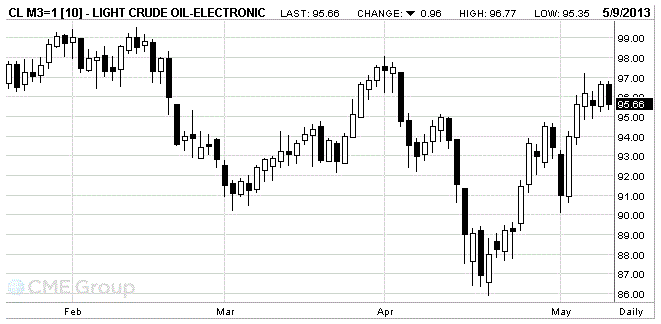- Analytics
- News and Tools
- Market News
- Oil: an overview of the market situation
Oil: an overview of the market situation
Oil prices fell, dropping below $ 96 a barrel, which was accompanied by a significant strengthening of the U.S. dollar to some other foreign currencies.
Note that the impact on the dynamics of trade data from the U.S. Department of Labor, which showed that the seasonally adjusted number of Americans who applied for unemployment benefits fell by 4,000 to 323,000. We also add that the number of layoffs has declined to pre-crisis levels. In addition, the report showed that the average number of calls in the last four weeks fell by 6,250 to 336,750, the lowest since November 2007. Economists say that the present value is a positive sign for the labor market because fewer layoffs generally coincides with an increase in employment. However, some economists say the uncertainty surrounding U.S. fiscal policy and the global economy constrains hiring, despite the fact that employers do not want to cut staff.
Note that in the context of positive data the dollar rose against other currencies, including the euro, British pound and Japanese yen. Since oil is traded in dollars, a stronger dollar makes oil less attractive to investors who use foreign currencies.
Add that to the energy markets have had a pressure higher than expected rates of inflation in China, which suggests that higher prices could slow the economy's second-largest oil consumer in the world.
The cost of the June futures on U.S. light crude oil WTI (Light Sweet Crude Oil) fell to 95.66 dollars per barrel.
June futures price for North Sea Brent crude oil mixture fell $ 0.37 to $ 103.90 a barrel on the London exchange ICE Futures Europe.

© 2000-2026. All rights reserved.
This site is managed by Teletrade D.J. LLC 2351 LLC 2022 (Euro House, Richmond Hill Road, Kingstown, VC0100, St. Vincent and the Grenadines).
The information on this website is for informational purposes only and does not constitute any investment advice.
The company does not serve or provide services to customers who are residents of the US, Canada, Iran, The Democratic People's Republic of Korea, Yemen and FATF blacklisted countries.
Making transactions on financial markets with marginal financial instruments opens up wide possibilities and allows investors who are willing to take risks to earn high profits, carrying a potentially high risk of losses at the same time. Therefore you should responsibly approach the issue of choosing the appropriate investment strategy, taking the available resources into account, before starting trading.
Use of the information: full or partial use of materials from this website must always be referenced to TeleTrade as the source of information. Use of the materials on the Internet must be accompanied by a hyperlink to teletrade.org. Automatic import of materials and information from this website is prohibited.
Please contact our PR department if you have any questions or need assistance at pr@teletrade.global.















